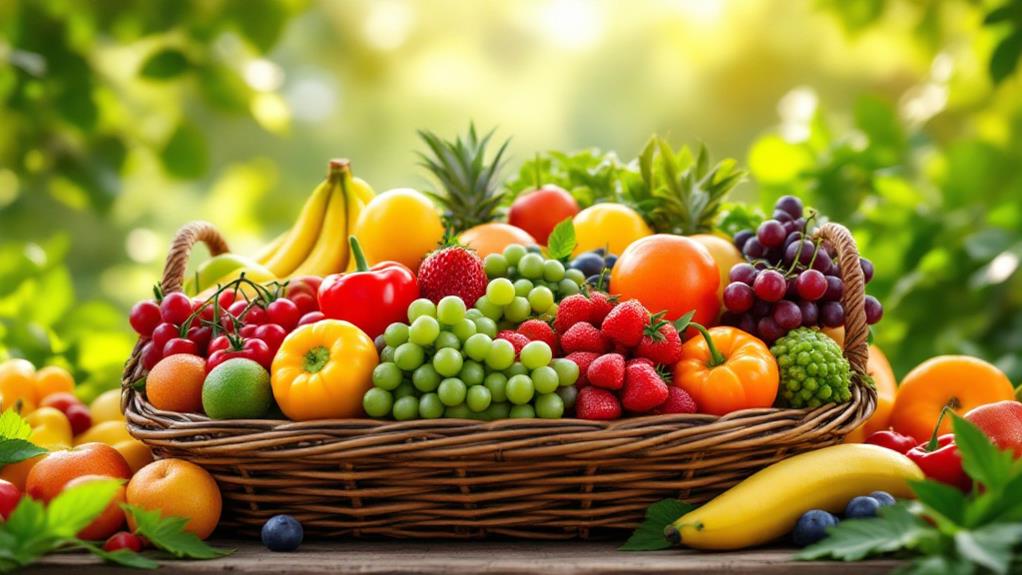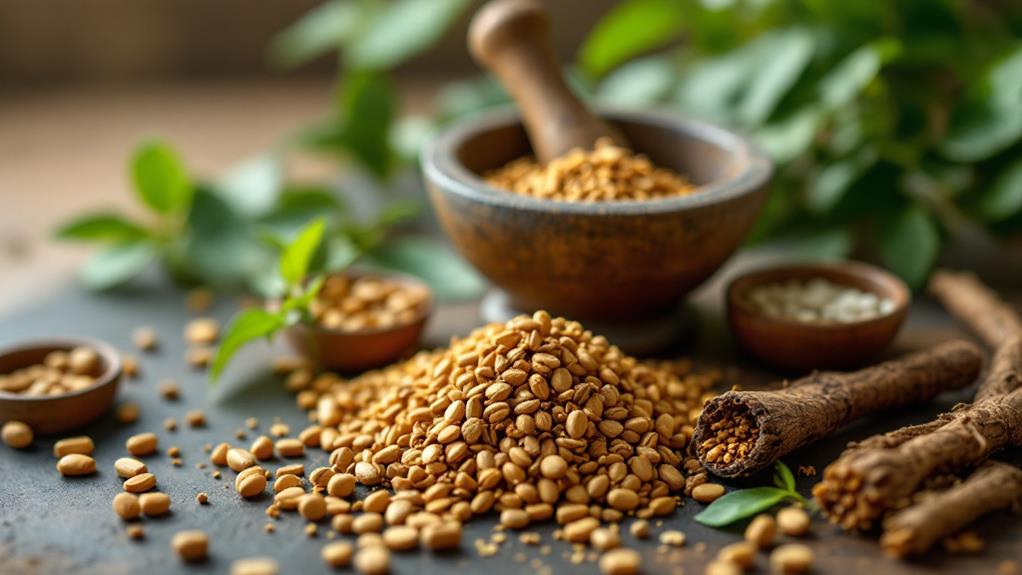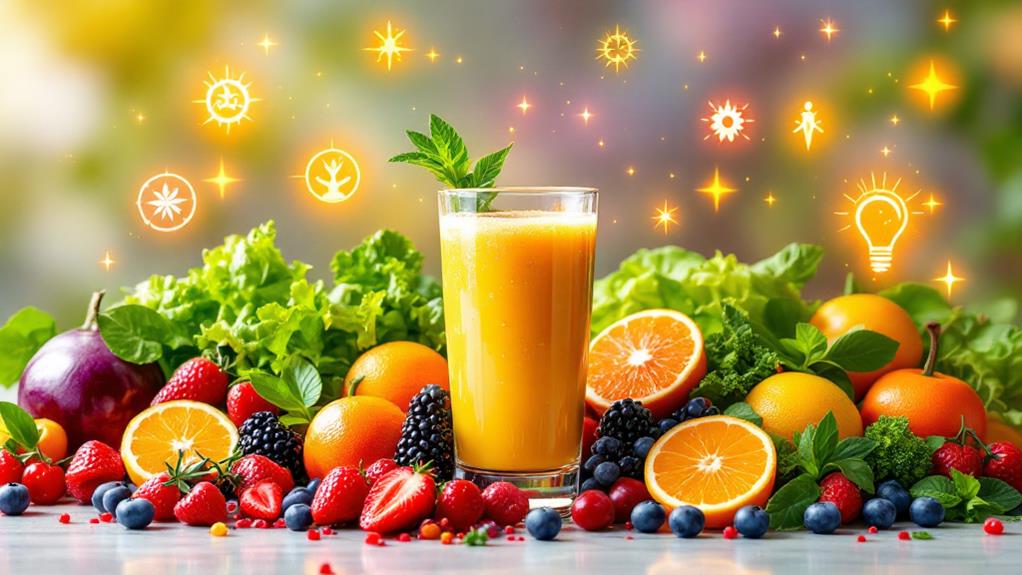The Benefits of Eating Organic Fruits: Why You Should Go Organic

Choosing organic fruits improves your health by delivering higher levels of antioxidants and nutrients, while minimizing exposure to harmful pesticides and antibiotic-resistant bacteria. You'll taste richer, more authentic flavors, as organic fruits often bypass synthetic chemicals, augmenting your snacking enjoyment. Supporting organic farming also means you're backing sustainable practices that benefit biodiversity and reduce environmental harm. Plus, buying organic encourages local agriculture, fostering community growth. With over 90% of organic fruits showing no pesticide residues, you enjoy safer, cleaner options. Investigate more to uncover how organic choices elevate your lifestyle and well-being.
Understanding Organic Certification
Understanding organic certification is essential to exploring the world of organic fruits. The USDA governs this certification in the U.S., enforcing strict guidelines that guarantee your organic fruits are grown without synthetic fertilizers or genetically modified organisms (GMOs). When shopping, you'll see the USDA Organic seal, which signifies that the product has been certified by a third-party organization. This certification assures compliance with organic farming standards, giving you peace of mind about the authenticity of what you're buying.
To qualify for the "100% Organic" label, a product must consist solely of organic ingredients. If labeled simply as "Organic," at least 95% of its content must be organic, while "Made with Organic Ingredients" indicates a minimum of 70% organic content. This clear labeling is vital for consumer trust, as the term "natural" isn't regulated by the USDA and can cause confusion about a product's true organic status.
Importantly, smaller producers who earn less than $5,000 annually can sell organic fruits without official certification, allowing them to participate in the organic market without high costs. By understanding these labels, you can make informed choices about the fruits you consume.
Health Advantages of Organic Fruits
When you choose organic fruits, you're opting for a healthier lifestyle with numerous benefits. Organic fruits are packed with more antioxidants and flavonoids, which are vital for reducing inflammation and combating oxidative stress in your body. This means you're not only enjoying delicious produce but also fortifying your health with every bite.
One of the significant health benefits of organic fruits is their lower pesticide residues. By avoiding synthetic fertilizers and pesticides, organic farming produces fruits that contribute to safer consumption, reducing your exposure to harmful chemicals. This is a key factor in promoting better general health and minimizing potential risks associated with conventional produce.
Furthermore, organic fruits are more nutrient-dense, thanks to farming practices that improve soil health and environmental sustainability. This results in produce that not only supports your well-being but also boasts a richer flavor profile. You'll find yourself enjoying tastier fruits, which can encourage healthier snacking habits.
Additionally, consuming organic fruits plays a role in public health by reducing your exposure to antibiotic-resistant bacteria. Organic farming bans antibiotics in livestock, offering you a safer choice and reinforcing general health benefits. So, by going organic, you're making a positive impact on your health and the world around you.
Environmental Impact of Organic Farming

While improving your health with organic fruits, you're also making a positive choice for the environment. Organic farming plays an important role in promoting biodiversity by steering clear of synthetic pesticides. This practice helps protect different species and keeps ecosystems healthy. By using natural fertilizers and crop rotation, organic farmers improve soil health, boost carbon sequestration, and greatly reduce chemical runoff into waterways. This means cleaner water for everyone and healthier ecosystems.
Moreover, organic farms support more pollinator populations like bees and butterflies compared to conventional farms. These pollinators are key for crop pollination, a significant ecosystem service that sustains food production. By avoiding genetically modified organisms (GMOs), organic farming preserves genetic diversity in crops. This genetic diversity is fundamental for building resilience against pests and adapting to climate change.
Organic farming also reduces greenhouse gas emissions. By minimizing the use of fossil fuels required for chemical production and employing sustainable agricultural techniques, organic farmers contribute to a healthier planet. When you choose organic fruits, you're not just making a healthier choice for yourself, you're also supporting farming practices that benefit the environment and future generations.
Pesticide Reduction and Food Safety
Amidst concerns about food safety, choosing organic fruits offers a clear advantage by greatly reducing your exposure to synthetic pesticides. Organic farming methods avoid synthetic pesticides and fertilizers, meaning you're less likely to consume pesticide residues. This is particularly significant for children and vulnerable groups, who are more susceptible to the adverse health effects linked to these chemicals.
Consider these key benefits:
- Lower Pesticide Residues: Studies show over 90% of organic fruits tested have no detectable pesticide residues, increasing consumer safety and reducing health risks.
- Reduced Health Risks: Organic farming minimizes chemical exposure for both consumers and farmworkers, helping mitigate potential health issues related to synthetic pesticide use.
- Decreased Antibiotic-Resistant Bacteria: By raising livestock without antibiotics, organic farming lowers the risk of contamination with antibiotic-resistant bacteria, enhancing overall food safety.
Choosing organic fruits is a proactive step towards safeguarding your health and the health of your loved ones. By opting for organic, you support a food system that prioritizes consumer safety and reduces potential health risks. So, when you're thinking about your next grocery list, remember the benefits of organic fruits for a healthier lifestyle.
Supporting Local and Sustainable Agriculture

Opting for organic fruits not only improves food safety but also plays an essential role in supporting local and sustainable agriculture. When you buy organic, you're directly elevating local economies and helping smaller, family-owned farms that prioritize environmental stewardship. These local farmers often engage in community-supported agriculture (CSA), offering you fresh, seasonal produce while reducing transportation distances and carbon footprints.
Organic farming practices are designed to promote biodiversity and maintain ecosystem balance. By choosing organic, you help reduce reliance on synthetic pesticides and fertilizers, which improves soil health and prevents chemical runoff into water supplies. This means you're contributing to better ecological health and supporting sustainable agriculture that focuses on long-term benefits like carbon sequestration and climate change mitigation.
Furthermore, when you support organic and local food systems, you foster a meaningful connection with the farmers who grow your food. This connection promotes transparency in food production and encourages sustainable practices that prioritize not only environmental health but also animal welfare. By making these choices, you're actively participating in a movement that values ecological health and the well-being of communities, both locally and globally.
Taste and Quality Differences
When you bite into an organic fruit, you're often met with a burst of flavor that sets it apart from its conventional counterparts. This superior taste stems from organic farming practices that naturally improve flavor profiles. Here's why organic fruits stand out:
- Natural Taste: Organic farming avoids synthetic pesticides and fertilizers, allowing the fruit's true flavors to shine. The absence of these chemicals means you experience a more authentic and natural taste.
- Peak Ripeness: Organic fruits are typically harvested at peak ripeness, unlike conventional fruits picked early for longer shelf life. This guarantees they're not only tastier but also more aromatic, providing a delightful eating experience.
- Higher Antioxidants: Studies show organic produce often contains higher levels of antioxidants, which contribute to richer and more complex flavors. These antioxidants not only improve taste but also offer health benefits.
Moreover, many consumers perceive organic fruits as fresher, partly because they don't contain preservatives that can alter taste. This freshness is often due to shorter transport distances, maintaining the quality differences you're looking for. Choosing organic fruits means opting for better taste and enriching your diet with nutrient-rich options.




